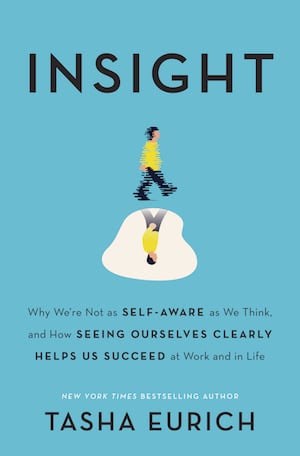3 Tips for Seeing Yourself More Clearly
Charley Kempthorne has been keeping a journal for more than 50 years. Every morning before the sun is in the sky, the professor-turned-painter carefully types out at least 1,000 words reflecting on his past, his beliefs, his family, even his shortcomings. The prolific fruits of his labor reside in an impressive storage facility in Manhattan, Kansas, where his estimated 10 million words are printed, bound, and filed.

This project, Kempthorne says, is an end in itself: “It helps me understand my life . . . or maybe,” he hedges, “it just makes me feel better and get [the day] started in a better mood.” But Kempthorne might be disappointed to learn that his enduring exercise may not have actually improved his self-awareness.
The journaling trap
At this point, you’re probably convinced I’ve gone completely off the deep end. Everyone knows, you might be thinking, that journaling is one of the most effective ways to get in touch with our inner self!
However, a growing body of research suggest that introspection via journaling has some surprising traps that can suck the insight right out of the experience. My own research, for example, has shown that people who keep journals generally have no more internal (or external) self-awareness than those who don’t.
How can we make sense of these peculiar and seemingly contradictory findings? The solution lies not in questioning whether journaling is the right thing to do but instead discovering how to do journaling right.
Psychologist James Pennebaker’s decades-long research program on something he calls expressive writing provides powerful direction in finding the answer. It involves writing, for 20 to 30 minutes at a time, on our “deepest thoughts and feelings about issues that have made a big impact on [our] lives.” Pennebaker has found that it helps virtually everyone who’s experienced a significant challenge. Even though some people find writing about their struggles to be distressing in the short term, nearly all see longer-term improvements in their mood and well-being.
Pennebaker and his colleagues have shown that people who engage in expressive writing have better memories, higher grade point averages, less absenteeism from work, and quicker re-employment after job loss.
Intuitively, one might think that the more we study positive events in our journal entries, the more psychological benefits we’ll reap from the experience. But this is a myth. In one study, participants wrote about one of their happiest times for eight minutes a day over the course of three days. Some were told to extensively analyze the event and others were instructed simply to relive it.
The analyzers showed less personal growth, self-acceptance, and well-being than those who relived it. Why is this the case? By examining positive moments too closely, we suck the joy right out of them. Therefore, the first take-home in seeking insight from journaling is to explore the negative and not overthink the positive.
Another trap journalers can fall prey to is using the activity solely as an outlet for discharging emotions. Interestingly, the myriad benefits of expressive writing only emerge when we write about both the factual and the emotional aspects of the events we’re describing—neither on its own is effective in producing insight.
Logically, this makes sense: if we don’t explore our emotions, we’re not fully processing the experience, and if we don’t explore the facts, we risk getting sucked into an unproductive spiral. True insight only happens when we process both our thoughts and our feelings.
Moderation, even in reflection
The final thing to keep in mind about journaling should be welcome news to everyone but Mr. Kempthorne. To ensure maximum benefits, it’s probably best that you don’t write every day. Pennebaker says, “that people should not write about a horrible event for more than a couple of weeks. You risk getting into a sort of navel-gazing or cycle of self-pity. But standing back every now and then and evaluating where you are in life is really important.”
Of course, if you’re a prolific journaler, the right approach may require some restraint. But with a little self-discipline, you can easily train yourself to write less and learn more.
 The capacity for self-examination is uniquely human. Though chimpanzees, dolphins, elephants, and even pigeons can recognize their images in a mirror, human beings are the only species with the capacity for introspection—that is, the ability to consciously examine our thoughts, feelings, motives, and behaviors. But many people are doing it wrong.
The capacity for self-examination is uniquely human. Though chimpanzees, dolphins, elephants, and even pigeons can recognize their images in a mirror, human beings are the only species with the capacity for introspection—that is, the ability to consciously examine our thoughts, feelings, motives, and behaviors. But many people are doing it wrong.
By avoiding these three pitfalls on the journey to self-discovery, you can realize the greatest benefit of journaling—to know yourself.
Disclosure of Material Connection: Some of the links in the post above are “affiliate links.” This means if you click on the link and purchase the item, we will receive an affiliate commission. Regardless, we only recommend products or services we use and believe will add value to our readers. We are disclosing this in accordance with the Federal Trade Commission’s 16 CFR, Part 255: “Guides Concerning the Use of Endorsements and Testimonials in Advertising.









